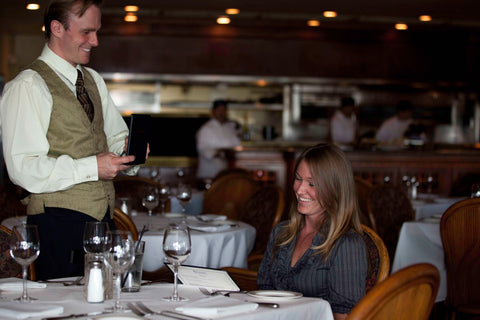Waiting tables is a challenging, fast-paced profession. During a typical restaurant shift, servers are presented with numerous overlapping and constantly changing tasks.
Perhaps that is why many consider multitasking an essential skill for waiters and waitresses to master. According to MIT Neuroscience Professor Earl Miller, people are not capable of multitasking. So how do waiters and waitresses succeed and efficiently manage multiple service tasks?
Like a juggler, servers always have lots of "balls" in the air. A four top are sat. Entrées need to be run to a two top while a table of business people waits to order. All of this while the server delivers a tray full of drinks to a six top. And that's a four-table station. Then, in the middle of the night, that server wakes up in a cold sweat realizing they didn't sing happy birthday to table 24!
Taking your eye off the "ball," even for a moment, can throw even the best server into the weeds or cause them forget something they shouldn't have. That is one of the reasons we invented the Waiter Wallet, to help provide organization and structure in an otherwise unstructured environment. A small note in the Waiter Wallet's Clear Pocket, for example, could have kept that important birthday reminder (or comp, guest allergy or service note) constantly in front of the server.
But, even armed with a Waiter Wallet, if servers can't multitask how to they juggle so many responsibilities? According to Professor Miller, what humans do is switch from task to task and not simultaneously perform multiple tasks. So, the faster we can switch from task to task, the better we think we are multitasking.
Given this understanding, what can restaurants and servers do to improve their efficiency in handling so many simultaneous tasks throughout a busy shift?
First, a server must be able to prioritize their duties quickly. A keen understanding of what needs to be done when may sound simple, but there are complicating factors that can make this challenging. Influences like what tasks are most urgent, the time necessary to complete a task and the distance from each task all factor into the decision making process.
So, barring an emergency, a balance between what is most important relative to the time each task takes can prioritize a less important, quick task over a more important, longer task.
An exercises like, verbally walking through the micro-specific details of the various front of the house restaurant tasks during pre-shift can be an effective way to decrease the time it takes servers to mentally switch from task to task and thereby improve their "multitasking" capabilities.
Such exercises also provide an excellent opportunity for rock star servers to share their thought process with their fellow waitpersons. Now only does this help less experienced waiters and waitresses make better decisions but, by consciously thinking and verbalizing their process, it can help even those star servers perform better.
Also, important factors in prioritizing tasks are a clear understanding of the current environment and resources available to complete them. Ensuring servers know the resources available and, more importantly encouraging them to use them without any judgment, can positively impact a server's efficiency and decision-making process.
Lastly, the restaurant environment has numerous distractions, both avoidable and unavoidable, that can make it challenging to maintain focus throughout the shift. By eliminating anything that is not essential to food service process until after the shift is critical to set waiters and waitresses up for success. While a cell phone may be an obvious distraction, "if you can lean you can clean" philosophies and other non-service related business, may have their place but, ideally, not during service.
Over-programming waitstaff with too many relatively trivial tasks can result in them forgetting a more critical task. By prioritizing service tasks and eliminating anything that isn't essential to service, management can reduce any unnecessary distractions and help their servers stay focused on what is most important.
Ultimately, whether it is called multitasking or not, helping waiter and waitress prioritize their tasks helps them, their guests and the restaurant. So let's prioritize this task and get it done.
If you enjoy our blog and would like to stay tuned, CLICK HERE



